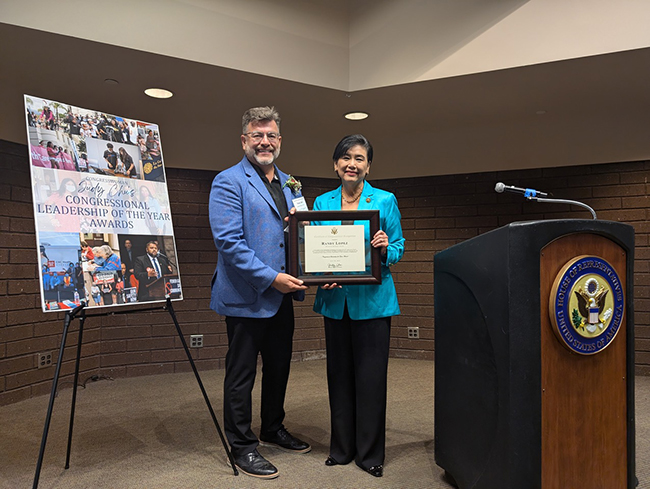Courier will remain an independent source of fact-based local journalism

Martin and Janis Weinberger inside the Courier production office at 112 Harvard Avenue in the late 1970s. Martin was proud the Courier had all the latest technology. Now a laptop computer replaces all those machines and chemicals in the background. Courier file photo
by Peter Weinberger | pweinberger@claremont-courier.com
Martin and Janis Weinberger were only married two years when they decided in 1955 to purchase a small community newspaper called the Claremont Courier. And it didn’t take long for Claremonters to figure out the Courier — and Claremont — were going to change dramatically in every sense of the word.
Martin and Janis were activists who created an environment where journalists could excel. Over the ensuing decades, the Courier earned the trust of our readers as an award-winning, authoritative source of local news.
Fast-forward to 2023 and it seems the walls are collapsing around local journalists who are working in an environment of ever-tightening budgets, drops in advertising revenue, false attacks from the radical right eroding trust in their reporting, and increasing prevalence of misinformation and propaganda.
Even with enormous support from Courier readership, there is still so much work to be done to ensure responsible, accountable journalism plays a significant role in a changing world for the next generation.
Creating a long-term rainy day fund
I am confident we can work together to keep the Courier independent from these negative influences. In fact, I believe we can make an even greater impact going forward, beginning with the establishment of the Martin and Janis Local Journalism Fund.
What will this fund be used for? Simply put, this stand-alone account would be a rainy day backstop to cover regular expenses, tapped only when the Courier has cashflow issues that can occur when advertising or subscription payments are delayed, or we have special needs due to unforeseen circumstances, such as a pandemic.
Back in 2020, the Courier laid off 30% of its staff. In truth, we would have gone out of business be it not for PPP grant support. The difficult financial emergency caused a huge amount of heartache, even anger, because of the harsh choices I had to make. Can you imagine what it feels like to tell a longtime employee they don’t have a job during a pandemic? The hope is the Martin and Janis Local Journalism Fund will provide assurances that we will never be in this situation again. Next time, and there will be a next time, help may not arrive to save us.
The Courier pays its bills on time and will continue to do so. But what happens when our invoices are not paid on time? The large majority of our customers are small businesses, most of which live on tight budgets and profit margins. When the Courier is owed over $100,000 — money we usually receive — how do we survive and pay our bills? For the last 68 years the money has come from the bank of Weinberger. And that is not a long- or short-term solution.
When I arrived in Claremont from my home in Charlotte, North Carolina in October 2007, my father was in a nursing home after knee-replacement surgery and could no longer manage the Courier. What was the first thing I had to do? Write a $65,000 check to cover expenses.

The new Courier desktop website has been redesigned in a new clean, streamlined format with more our the content our readers enjoy.
This is another example of a financial situation that is too risky for a business so deeply enmeshed in the fabric of Claremont. Our goal for the journalism fund is to secure three months of revenue and save it. That’s a conservative figure and low by many standards but does amount to roughly $210,000.
What happens if Claremont loses the Courier?
This is a scenario that I will never accept, but the current climate has forced me to think about it over the last year.
To donate please go to: https://claremont-courier.com/payments/
News coverage
Numerous studies have detailed the dire consequences when a local newspaper stops publishing, creating a “news desert.” The most immediate impact is the obvious loss of local coverage. Important events, issues, lectures, and meetings can go unreported or underreported. This can lead to a lack of transparency and accountability, as there is no longer a watchdog keeping an eye on city government, business, and other institutions. I believe we have an excellent group of city officials (both elected and in city hall) irrespective of their political leanings. Part of this good fortune is due to the fact that public employees in Claremont are under a microscope due to our diligent coverage, and also of course from a very involved populace — who rely on their local newspaper to stay informed.
Civic engagement
Without the Courier, residents will be less informed about what’s happening in Claremont, which can lead to a decrease in civic engagement. The public may be less likely to attend public meetings, participate in local elections, or support community organizations like Claremont’s nonprofits. There would be fewer people working together on important issues.
Economic impact
The Courier is an important source of revenue for local businesses. These businesses may have fewer options for advertising, which could hurt their bottom line. Additionally, a decline in local news coverage would make it harder for businesses to attract new customers, business, and investment.
Loss of historical record
Local newspapers and websites are often the primary source of historical record for a community. They document important events, milestones, and changes over time. If the Courier goes out of business, historical records can be lost or fragmented. Luckily, we have Claremont Heritage to preserve this historical record. But if there’s no documentation of Claremont civic life going forward, what exactly is there to preserve? Without the Courier, future generations would have a hard time understanding our history and culture.
Rise of misinformation
Without a trusted source of local news, residents may turn to social media or other sources for information about their community. These outside sources don’t have 115 years of reporting behind them, like the Courier. They aren’t enmeshed in the fabric of the city, like the Courier. They aren’t able to report with the historical context of an institution that has grown with Claremont from near its beginnings, like the Courier. And perhaps most importantly, outside news sources aren’t invested in our community, like the Courier. Our award-winning journalists have proven they can be trusted to report on the city they call home. The Courier reports real news. We don’t truck in misinformation or rumor, and we take our jobs quite seriously.
Why now?
Some may question why we are turning to the public to create the Martin and Janis Local Journalism Fund. I understand it may seem distasteful to engage the public in what might appear a private financial matter.
But the Courier isn’t a private company. We are a nonprofit newsroom. As such, we belong to our community. Once there were local newspapers in most small towns in America. With the rise of the internet, consolidation in the news industry, and ever-shrinking print advertising revenue, the Courier stands as a throwback to those days when the local paper kept its readers informed about the school board and city council, about the art exhibits, and a locals who were doing big things in the world at large.
They called these publications, “the paper of record.” At the Courier, we are proud to be Claremont’s paper of record. We believe we are doing important work, and that now more than ever, local journalism matters in a world where it’s so easy to be fooled by bad actors with an ax to grind.
So, we ask for your help in ensuring we continue to be there for Claremont. Please consider a tax-deductible donation to the Martin and Janis Local Journalism Fund.










0 Comments